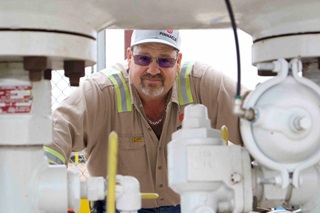Propane uses
Propane is mainly used for home and water heating, cooking, clothes drying, and powering heavy equipment. Propane is nontoxic, colorless, and odorless, which is why a rotten eggs smell is added to propane for safety. With over 50 million residential propane users in the United States alone, the safety record of propane is very strong considering the vast number of applications. Explore our blog post on propane uses to discover its varied applications. The rest of this article will cover propane hazards and propane dangers, as well as what to do in case of emergency.
Propane hazards
A common misconception of propane is that it is one of the main causes of fires in the United States. In fact, the National Fire Protection Association does not even list propane as a source of residential structural fires in the US.
Accidents do happen due to propane misuse or other occurrences. Here are some common hazards associated with propane:
- Leaking valves or connections: Rarely, propane will leak out of the valves or connections due to damage or improper installation.
- Damaged tanks: Propane tanks are tough, but can become damaged when heavy objects like trees fall on them.
- External heat source, such as fire: House fires or wildfires are especially dangerous for bulk propane tanks.
- Underground line damage: Yard work or construction can occasionally damage underground propane tank lines. If this happens, call 911 immediately.
- Adverse weather events: Hurricanes and thunderstorms can damage propane tanks from falling debris or lightning.
It is important for propane customers to know the signs and symptoms of propane leaks (listed below) and what to do in case of exposure to propane hazards. In case of emergency, dial 911 and then call Pinnacle Propane 972-444-0300. Discover further propane safety procedures in on or page.
Propane explosions
The actual risk of propane explosions is very limited and are often the result of outside elements. It is imperative that you know the risks of propane explosions when using propane. Even proper use does carry risks due to outside elements such as fires.
Common signs and symptoms of propane gas leaks:
- Hear hissing around valves or connections
- Appliances not working properly
- Hard to breath in confined areas
- Signs of propane poisoning like dizziness and nausea
Immediate steps to take when faced with a propane emergency
If you should experience any of the above signs or symptoms of propane dangers then you must take immediate actions:
- Have everyone leave the home immediately
- Do not touch light switches or appliances
- Leave the door open
- Go to your propane tank and turn the green valve to the off position
- Call 911
- Call Pinnacle Propane 972-444-0300
- Allow emergency personnel to assess the situation
- Schedule an inspection with Pinnacle Propane
Propane tank explosions sometimes happen in the event of wildfires or structural fires they are close to. Fire can cause BLEVE (Boiling Liquid Expanding Vapor Explosion) when the external heat source causes the liquid propane to expand, increasing the pressure inside the tank. All propane tanks are equipped with a pressure relieving valve, but sometimes the intensity of the fire is too much for the valve to do its job.
Is propane dangerous?
Propane is non-toxic, but it is an asphyxiant. Propane health hazards involve inhaling propane and frostbite. Propane should never be released in a confined space because of the risks of inhalation and propane poisoning. If you should suspect a propane leak inside your home, open doors and windows and leave the premises immediately.
Propane is an effective refrigerant because of the heat it needs to turn from a liquid to a gas. A propane tank hazard can be frostbite if you touch the valve as propane is turning from liquid to a gas. Liquid propane should never be touched because of this danger.
Of all civilian casualties in the United States, .00007% have propane listed as the cause. Less than 1% of residential fires list propane as the immediate cause. Although propane use in the US is rising, the safety record of this fuel remains unchanged.
Safety precautions and best practices
When stored and handled properly, propane hazards and propane dangers can be effectively mitigated. Here is how to avoid improperly handling propane so you can safely enjoy its benefits for many years.
Propane safe handling tips
- Handle propane tanks carefully
- Never use propane tanks indoors
- Have bulk propane tanks regularly inspected and recertified
- Contact qualified personnel to move propane tanks
- Have propane tanks connected and disconnected by professionals
Propane safety begins with you. Make sure you understand the ways to recognize propane risks like smelling rotten eggs or hearing hissing sounds. And also make sure you know your propane emergency plan like the one listed above. We suggest you write down the steps listed above including phone numbers and post them somewhere in your home.
Conclusion
Pinnacle Propane is committed to providing customers with affordable, accessible propane safely. Our experts will walk you step by step through all safety precautions and information you need to enjoy the vast benefits of using propane safely in your home.
Propane hazards and propane dangers are real. Understand them before becoming a propane customer. Also not the safety record of propane with proper handling and storage.


